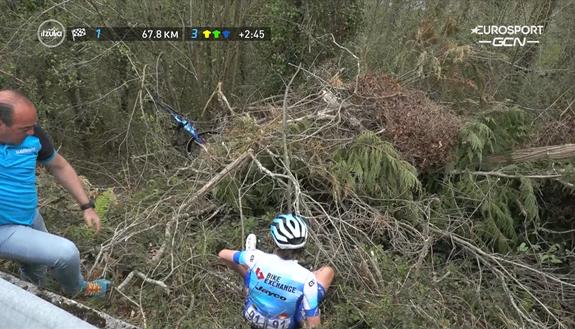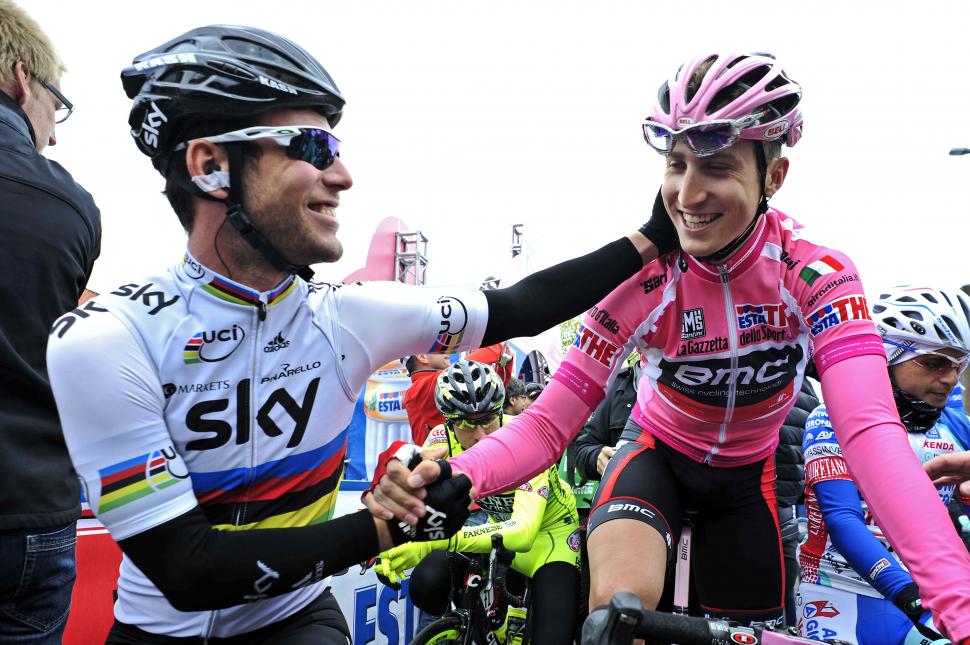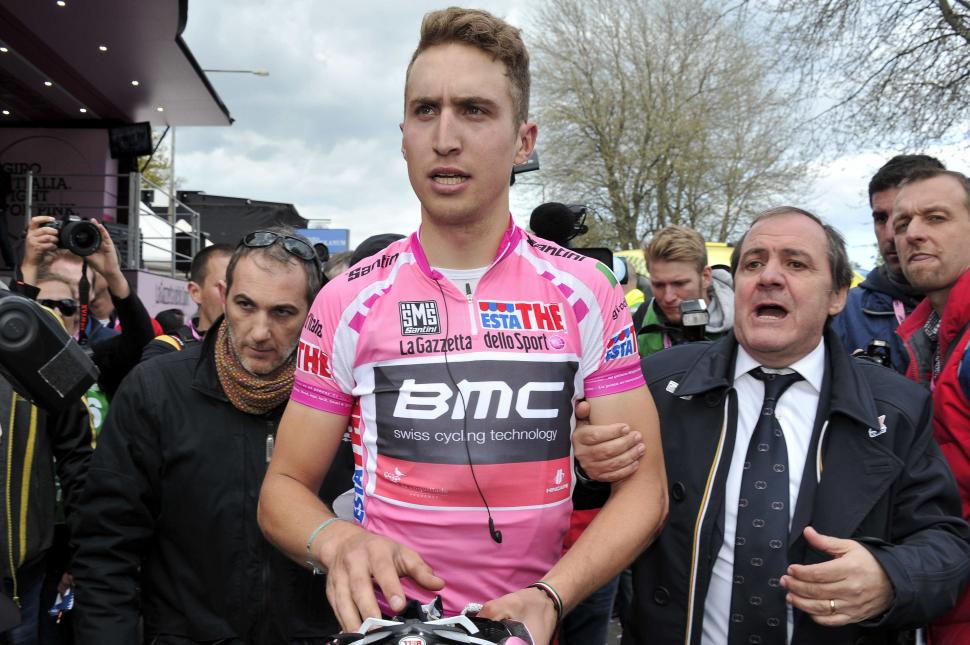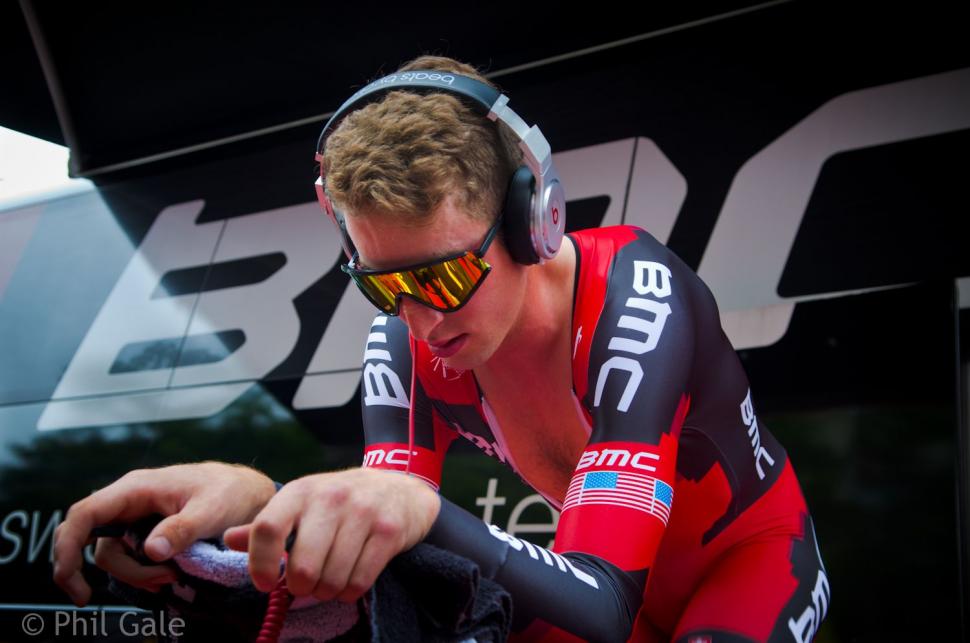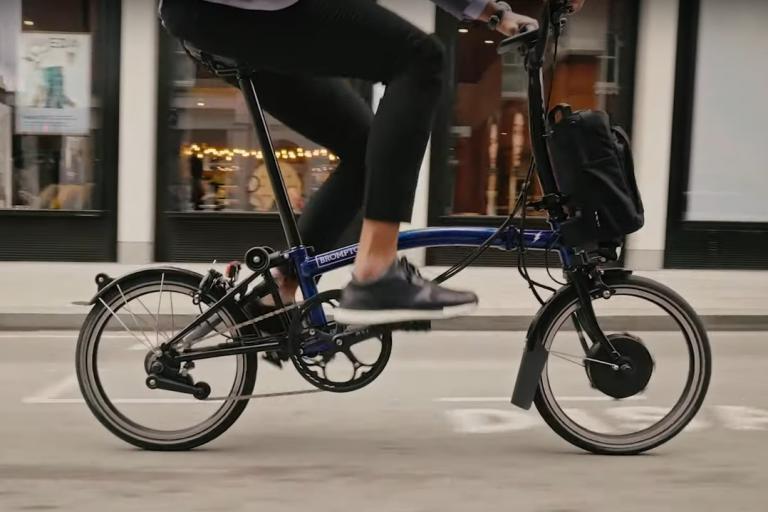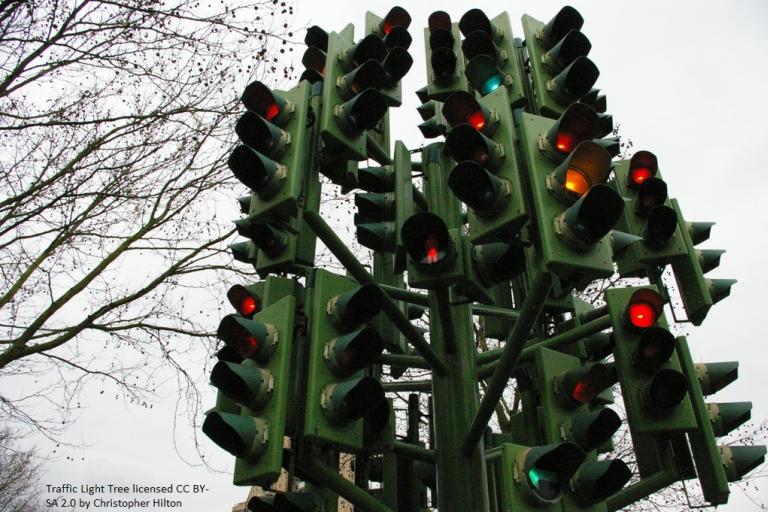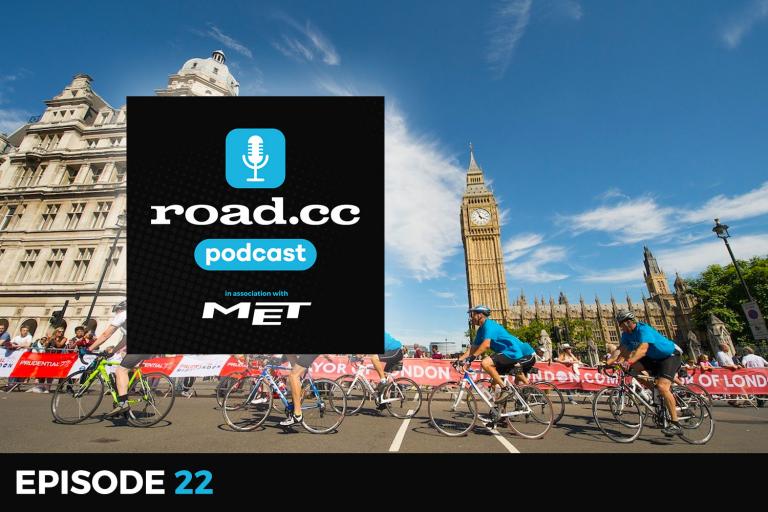- News
- Reviews
- Bikes
- Accessories
- Accessories - misc
- Computer mounts
- Bags
- Bar ends
- Bike bags & cases
- Bottle cages
- Bottles
- Cameras
- Car racks
- Child seats
- Computers
- Glasses
- GPS units
- Helmets
- Lights - front
- Lights - rear
- Lights - sets
- Locks
- Mirrors
- Mudguards
- Racks
- Pumps & CO2 inflators
- Puncture kits
- Reflectives
- Smart watches
- Stands and racks
- Trailers
- Clothing
- Components
- Bar tape & grips
- Bottom brackets
- Brake & gear cables
- Brake & STI levers
- Brake pads & spares
- Brakes
- Cassettes & freewheels
- Chains
- Chainsets & chainrings
- Derailleurs - front
- Derailleurs - rear
- Forks
- Gear levers & shifters
- Groupsets
- Handlebars & extensions
- Headsets
- Hubs
- Inner tubes
- Pedals
- Quick releases & skewers
- Saddles
- Seatposts
- Stems
- Wheels
- Tyres
- Health, fitness and nutrition
- Tools and workshop
- Miscellaneous
- Cross country mountain bikes
- Tubeless valves
- Buyers Guides
- Features
- Forum
- Recommends
- Podcast
news
Taylor Phinney: Cycling was “f*cked up”; Rusty Raleigh Chopper sells for £700; “We are not the Netherlands”; Cyclists are entitled…to get home alive; Tell me you’re a cyclist without telling me you’re a cyclist; Big Mamil Energy + more on the live blog
SUMMARY
 Taylor Phinney after stage two of the 2017 Tour de France (via YouTube).jpg
Taylor Phinney after stage two of the 2017 Tour de France (via YouTube).jpg08 April 2022, 16:03
Tell me you’re a cyclist: your submissions
Earlier today I asked you all to come up with your own examples for that ubiquitous internet challenge: ‘Tell me you’re a cyclist without telling me you’re a cyclist’.
And fair play, you came up with some great ones. Here are some of the best:
Rambling on country lanes, I have succumbed to the odd "Car down!"
When writing down directions my kids naturally write in "Audax": R@T, L@X, 3@O, and so on.
You can tell our man VecchioJo Burt is a cyclist because he tucks his head down with his hands on the top of the steering wheel when driving downhill.
My son says 'Allez' a lot, has done since he was 3. He also has 4 bikes. He's 8.
I take the dogs for a walk, and as soon as I take them off the lead, they drop me.
Always makes a head check before turning right, even if it's only turning into an aisle at the supermarket.
Describes any other cyclist in terms of the bike they were riding ("This woman came by on a Colnago C64..."; "What, the one who was naked and throwing out free money?"; "Was she, I didn't notice").
Dresses in elbow-length shirts and three-quarter length trousers in summer even on the hottest days because they want to preserve the pro tan (an extreme case but I have known more than one person do it!).
I jog round the block with my daughter and find myself pointing out holes and shouting hole left or right without batting an eyelid, exactly the same as I'm on a club ride. 12-year-old daughter does it as well.
I actually do that one too while walking, performing the ‘cyclist’s point’ if there’s something unsavoury to step in ahead…
I've been known to wear a casquette with a small amount of luft when walking around town.
Quite normal to see me wearing a rain cape while walking about town if it's raining.
Shaved legs in summer is normal.
And finally…
When driving not being afraid to sit behind a cyclist (not right on their wheel!) for a couple of minutes because there is nowhere safe to overtake.
Have a good weekend everyone!
08 April 2022, 15:46
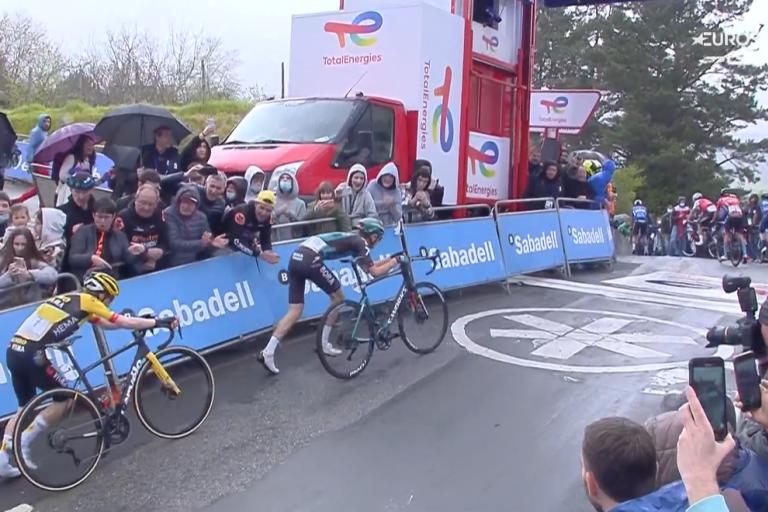
Vlasov and Vingegaard go for a run as Remco takes yellow
Shades of Froome on the Ventoux here as Aleksandr Vlasov and Jonas Vingegaard resorted to running with their bikes after crashing on the slippery steep final climb to Mallabia at the Tour of the Basque Country.
Chris Froome inspired pic.twitter.com/K2Vt4AQ5r8
— Robyn (@robynjournalist) April 8, 2022
As Carlos Rodríguez held on grimly for an impressive breakaway victory, Remco Evenepoel moved into the race lead after instigating the crucial move on the day’s penultimate climb, distancing both the yellow jersey Primož Roglič (who looked lacklustre) and Adam Yates, who now sit a minute behind the young Belgian on the GC going into tomorrow’s crunch final stage.
Rodríguez’s Ineos teammate Dani Martinez, second on the day, also sits second overall, two seconds behind Evenepoel. That’s a lot of seconds…
08 April 2022, 15:14
Pog apologises to Van Baarle for Flanders outburst
One of the sagas of the week seems to finally have been settled – Tadej Pogačar has apologised to Ineos Grenadiers rider Dylan van Baarle for his angry outburst after the dramatic finale to last Sunday’s Tour of Flanders.
Pogačar uncharacteristically lost his cool after he was boxed in when Van Baarle and Valentin Madouas caught the 23-year-old Slovenian and Mathieu van der Poel in the final 400 metres of the Ronde, leaving the two-time Tour de France winner a disconsolate fourth.
But Van Baarle has revealed that Pog apologised a day later, in the way only a true Gen Zer can – through Instagram.
The Dutchman told Laurens Ten Dam’s Live Slow Ride Fast podcast that Pogačar reached out to him on the social media app to write: ‘Sorry, but I was frustrated and I wish you the podium’.
“He doesn't have my number, but sent it via Instagram,” Van Baarle said. “That was really cool.”
Explaining his rival’s outburst, Van Baarle said: “He thought I had deviated from my line and locked him up on purpose," he said. "But he was probably frustrated that he screwed up himself. I was probably the first one he met after the finish.”
And now this is finally all done and dusted, and we can all move on with our lives, let’s enjoy one last watch of a rare angry Pog moment:
08 April 2022, 14:43
“They get on their bikes and they’re free”
Here’s an inspiring a story for a Friday afternoon.
Pedal Power Cycling Club, an joint initiative from Brain Injury Matters and cycling and walking charity Sustrans, was established in 2019 for adults with brain injuries to help their recovery and physical mobility, as well as providing a social space form them to enjoy cycling.
The club meets every Friday morning in Belfast’s CS Lewis Square, in the shadow of Harland and Wolff’s Samson and Goliath cranes, for breakfast and a cycle on specially adapted bikes and trikes to cater for those with brain injury.
48-year-old Graham Hill, a keen cyclist who discovered he had a brain tumour in 2012 which affected his ability to walk, says the club has rekindled his love of cycling.
“I had a road bike and I used to go out 50, 60, 70 miles no problem,” Graham said. “And I cycled around Lough Neagh six times.”
“It was back in 2012, I was diagnosed with a brain tumour… I spent months and months in hospital.
“I was seeing a physiotherapist there and she says: ‘Do you like cycling? Brain Injury Matters have this Pedal Power’. So I’ve been coming ever since.
“I’m not very good on my feet, and my balance is non-existent – so I can’t walk very far.
“But if I’m sitting on a bike like this, like a trike, I can go for miles.”
Dr Jonathan McCrea, head of services at Brain Injury Matters, said: “It is one of the most spine-tingling moments when you see people who have had profound life-changing injuries come here.
“They have lost their sense of self and all of sudden they leave their walking frames behind, get on the bikes and they’re free.”
08 April 2022, 14:13
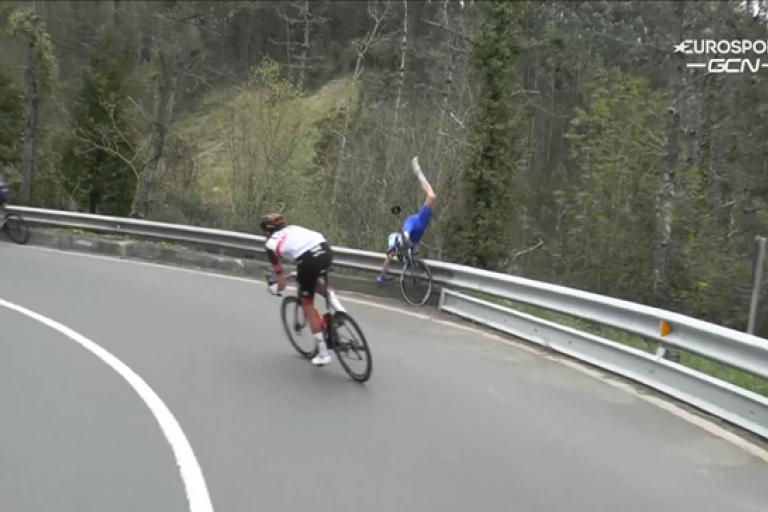
BikeExchange rider crashes over barriers at Tour of the Basque Country
A scary moment here for BikeExchange’s Lucas Hamilton, who misjudged a corner at the Tour of the Basque Country and ended up flying over the barriers.
Fortunately, the Australian rider – who in the breakaway alongside Marc Soler and Carlos Rodríguez at the time of the crash – didn’t have too far to fall, though his bike ended a bit further down the ravine.
According to his DS Matt White, Hamilton – who has since abandoned the race – suffered a bloody nose and a few cuts, but doesn’t appear to have broken any bones and was speaking clearly while he was being treated in the ambulance.
A frightening one then, but as White told GCN commentator Nico Roche, “he got lucky”.
#Itzulia @lucashamilton8 was helped back over the barriers by team staff but unfortunately he has abandoned the race ❌
More info when we get it. pic.twitter.com/1Fhu30Vheu
— Team BikeExchange-Jayco (@GreenEDGEteam) April 8, 2022
08 April 2022, 15:19
British Cycling suspends transgender policy
BREAKING: British Cycling Board of Directors has voted in favour of an immediate suspension of its transgender policy.
"We understand there are concerns regarding the extent to which our current policy appropriately reflects the Sports Councils’ Equality Group guidance" pic.twitter.com/TRWSvZ29ZC
— Sean Ingle (@seaningle) April 8, 2022
We will have more on this story as we get it.
08 April 2022, 13:32
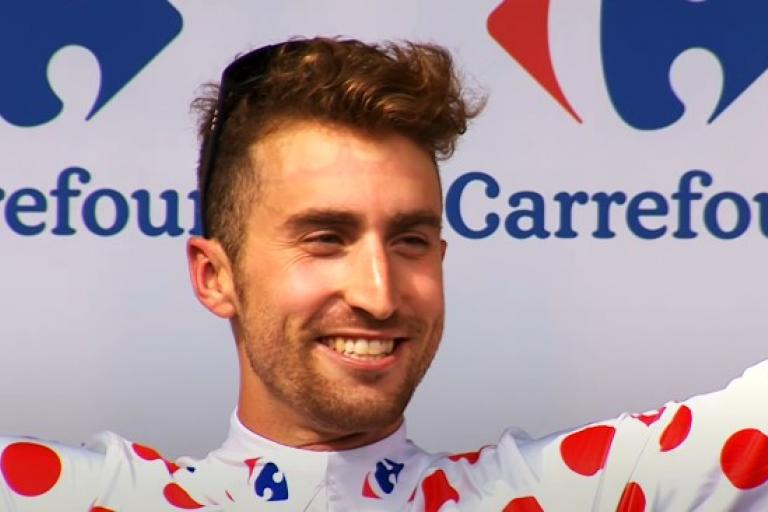
Cycling was “f*cked up”: Taylor Phinney opens up about drug abuse and the culture of silence within pro cycling
Former American pro Taylor Phinney has opened up about drug abuse and the culture of silence in the peloton in a revealing interview for the ‘Outspoken’ Thereabouts podcast.
Phinney, the son of ex-7 Eleven rider Davis Phinney and Olympic gold medallist Connie Carpenter, retired in 2019 at just 29 after nine years as a professional at BMC and EF Education First.
His stage win and stint in the pink jersey at the 2012 Giro d’Italia cemented his status as American cycling’s next big thing as it emerged blinking from the Lance Armstrong era and forced to deal with the aftershocks of the Texan’s doping confession less than nine months after Phinney’s Italian triumph.
> Giro d'Italia Stage 1: Phinney flies to time trial win, Team Sky's Thomas second
Despite his undoubted talent Phinney generally failed up to the high expectations placed upon him after his 2012 breakthrough, which also included a career-high silver medal at the world time trial championships and fourth place in both the road race and time trial at the London Olympics, largely due to the after-effects of a career-threatening injury sustained in a crash at the 2014 US road race championships.
Never a conformist, Phinney often cut an eccentric figure in the conservative, insular world of professional cycling.
In the candid podcast interview, he revealed how his outspoken nature often got him in trouble with team management, especially when it came to doping, which Phinney says was still rampant even during what is generally perceived to be the post-EPO era.
“There was a time when I was quite outspoken about finish bottles in races,” he said. “When I first started racing the EPO and blood doping era was seemingly past but there was still a huge amount of opiate abuse in the sport.
“I don’t know if that has completely gone away but it was pretty widespread in my first couple of years that you would smash a couple of Tramadol at the end of the race, which is basically like taking a Vicodin or two along with a bunch of caffeine and maybe some Sudafed.
“That’s a bomb right there, if I took one of those right now it would send me to the moon. I was never into that. I would get offered that, but I was like I don’t think I need an opiate painkiller today to get through this race.
“But [Tramadol abuse] was just a thing, especially in the Classics, so many of the guys were doing that. I was kind of like, ‘this is fucked up’.
“So I said some stuff about it in an interview, and then I also talked about how there was a fair amount of coincidentally timed cortisone injections being given to some people going into certain races.
“You don’t need it. If you need a cortisone injection you should be out for a while. Not like, I just got a cortisone injection and now I’m like, winning Flanders.”
Phinney said that he only received cortisone – the drug at the centre of Bradley Wiggins’ TUEs before the 2011 and 2012 Tours de France – after he broke his leg at the 2014 US Nationals.
“I was just flying and half of my leg didn’t work,” he said. “I was like, OK, I think I understand this now. I spoke out about that and I received quite a bit of backlash from the management.”
Phinney then talked about how the law of silence within cycling regarding doping – commonly known as the omertà – was still prevalent throughout his career and that he wrongly assumed that he would be celebrated for speaking out about some of the sport’s darker secrets.
After racing as a junior for Trek-Livestrong and then briefly as a stagiaire for Lance Armstrong’s Radioshack team, Phinney turned pro with BMC, where he was managed by Jim Ochowicz, the man in charge of Armstrong’s Motorola team in the mid-1990s. In 2017, he joined the Cannondale team owned by Jonathan Vaughters, a former teammate of the Texan known for his anti-doping stance.
He said: “I mean, of course, as an entitled young American, a confident young man, I was like of course I should be able to say whatever I want about this because in my mind this is wrong and that’s what you grow up reading about in the news. People talking about the things that are wrong and then hopefully the thing gets fixed.
“But once you’re inside of the machine and you start talking about the things that are wrong, and then those things are closely linked to where your paycheque is coming from.
“You’re in a position where people can tell you what to do and punish you for not obeying the most random rules that they can put in place at any point in time. You realise actually you’re not like Harry Potter, you’re not the hero of this story because you have to shut up.”
“I definitely struggled in my first couple of years just with feeling like I couldn’t express myself. Or that I wasn’t celebrated in the way I thought I should be for speaking out honestly about things I thought were wrong within the actual group of the peloton or management itself.
“Outside of that people were like ‘yay he’s speaking up’ against this or that. But within the group, there’s very much this ‘this is our secret, our world’.
“As the rider, because you go out to do the race, in your mind you think you are the most important person. It’s also everyone has this job to make you think you’re important. But you realize there are all these people above you holding these strings and you really have no power.
“You can’t do anything about it, they own your image rights. They own… they own you.”
08 April 2022, 13:00
08 April 2022, 12:17
‘But why can’t we be like the Netherlands?’
Instead of asking who would like to travel like this, perhaps we should ask who wouldn’t? 🚲 pic.twitter.com/oOdX2fA1v0
— Dr. Natalia Barbour (@natalia_barbour) April 7, 2022
08 April 2022, 11:24
“We are not the Netherlands”: Hove councillors win at cycling bingo
On Wednesday, you may recall, we reported that cyclists in Hove had lodged a petition to have “well-planned and high-quality permanent cycle lanes” installed on the Old Shoreham Road, after a pop-up bike lane was removed by local councillors in November 2021.
A counter-petition was created urging the council to keep the Old Shoreham Road cycle lane free – though as the Brighton Argus made clear in their questionable front pages, both petitions were the target of jokesters (though the Argus, in their haste to make the story all about a fake Hitler signature, neglected to mention in their report that 200 bogus, duplicate or triplicate names had been added to the anti-cycle lane petition).
> ‘Crass and insensitive’ front page slammed after ‘Adolf Hitler’ signs bike lane petition
In any case, the two petitions were brought in front of Brighton and Hove City Council last night. Unfortunately, despite local cyclist Darren Callow’s best efforts to convince the council that the cycle lane would leave a “positive legacy for future generations”, he was greeted with some familiar tropes from councillors opposed to the proposed scheme:
Actually got a "some of my constituents are keen cyclists" from a councillor. I had to laugh.
— Just some kid I used to know. (@Daren68) April 7, 2022
Just remembered, we were also treated to "we are not the Netherlands" did anyone else get something on their bingo cards?
— Just some kid I used to know. (@Daren68) April 7, 2022
The state of some of the responses. Apparently cycle lane users very confused when width of the lane changes? And the 'killer' statistic "I walked along there and counted 3 bikes".
— Alex (@hove85) April 7, 2022
Well done Darren. You were great and I was laughing with you. Some of the falsehoods and blatant lies said tonight were very disturbing. Im disappointed the whole thing wasn’t resolved tonight & it drags onto another ETS meeting. But great job though from you and thanks so much.
— Adam Bronkhorst (@AdamBronkhorst) April 7, 2022
Both petitions for and against the Old Shoreham Road cycle lane have been referred to the council’s environment, transport and sustainability committee for another round of almost certainly tedious back-and-forth.
If you don’t have much on this weekend, you can watch last night’s meeting at this link. Don’t forget to stock up on popcorn…
08 April 2022, 10:54
Cyclists are entitled… to get home alive
Thanks to @Pflax1 for creating this gem. Has already sparked multiple conversations today. Onward pic.twitter.com/5rxhLOVQLQ
— Josh Hare (@thejoshhare) April 6, 2022
A stylish t-shirt that doubles as pro-cycling propaganda? Count me in…
Journalist Peter Flax’s sartorial response to what he describes as the “feeble-minded pronouncement” that cyclists are ‘entitled’, simply because we want to get from A to B safely, is certainly a great conversation starter.
Promoting the t-shirt earlier this year, Flax said: “It’s time for bike riders to reappropriate the truth when it comes to entitlement. To take this misinformed invective and flip it into an anthem. Let’s be blunt: Cyclists may be entitled — but not in the way these idiots suggest.”
If you want to look cool, reframe a tired conversation, and troll anti-cycling motorists at the same time, you can buy the t-shirt from Flax’s website.
08 April 2022, 10:12
Move over Sergio Leone…
Now this is what you call a shot:
Para verlo en bucle 🙌🙌. Ese cambio de rasante y el pelotón que aparece de la nada #Itzulia pic.twitter.com/EPjlr5jjw0
— iker gallastegi (@ikguallas) April 7, 2022
08 April 2022, 09:49
Colorado drivers will have to think of another cycling bingo cliché now…
08 April 2022, 09:38
Tell me you’re a cyclist without telling me you’re a cyclist
Tell me your husband is a cyclist without telling me your husband is a cyclist, I'll go first:
Sam calls our son's vests "base layers"
😂👌
— Tara Bennett (@Tee4Tara) April 7, 2022
Since it’s Friday, let’s have a bit of fun in the comments – who can better Sam Bennett’s wife Tara’s excellent example?
My tell is that I say ‘clear’ when crossing the road as a pedestrian…
Any others?
08 April 2022, 09:22
Big Mamil Energy
Big mamil energy is some random bloke sitting on while I tow him at 30kph+ along the windy, flat section and then accelerating past me on the climb without saying a word. Well done to u.
— amylaurenjones (@amylaurenjones) April 7, 2022
I once had a mamil shout at me because he sat on my wheel when going up a climb and when I accelerated he was dropped. Stopped at the top to take a photo and he went off his head at me for going faster than him 🙃
— Kerry (@Kerry13_) April 7, 2022
Ugh, this happens to me aaaaall the time! Then I always do a little wave as I pass them once they’ve blown from their big effort up the hill just to pass me. Smugness overload.
— Charlotte Eleanor Broughton (@char_broughton) April 7, 2022
I was once pounding along into a strong headwind towards the hills on the Tour of the White Horses and started feeling pretty lonely. Looked behind and there are about 30 blokes sitting, no, cowering, behind me, got to the first hill and they all pushed off. Not one thanked me.
— The Mechanic (@hayres) April 8, 2022
And on the other side of the coin:
One time I towed a group of older gentlemen almost the whole Schelde path from Gent to Oudenaarde into a block headwind and when I pulled off they all thanked me. I’ll never forget that.
— Laura Weislo-USA (@Laura_Weislo) April 7, 2022
Any of our readers have their own examples of encountering – or perhaps displaying – Big Mamil Energy?
(I was going to shorten it to BME, but an acronym within an acronym feels like too much…)
Come on, don’t be shy…
08 April 2022, 08:48
“Felt like Ffordd Pen Llech”: G’s tough day in the break
2018 Tour de France winner Geraint Thomas has certainly been put through his paces this week at the Tour of the Basque Country.
Now I remember why I’ve only done this race once before 🤣 Savage climbs but the support here is incredible. Big day out with the boys, stronger day by day 👌 #Itzulia2022 pic.twitter.com/eHKXbUqUHv
— Geraint Thomas (@GeraintThomas86) April 6, 2022
On Wednesday’s stage three he spent kilometre after kilometre on the front of the peloton, over some shockingly steep ramps, to help tee up an attack by Ineos Grenadiers teammate Adam Yates, who unfortunately punctured in the closing kilometre as Pello Bilbao won the small-group sprint.
Yesterday, the 35-year-old Welsh rider made the break of the day on another relentlessly tough stage. Despite being caught by the GC group with nine kilometres to go, another of Thomas’ Ineos mates, Dani Martinez, took the stage by a whisker ahead of Julian Alaphilippe (the Colombian nearly ‘doing an Alaphilippe’ in the process by celebrating a little prematurely as the world champion threw his bike at the line).
Go in the break they said
Be fun they said pic.twitter.com/8sgopRdqJU
— Geraint Thomas (@GeraintThomas86) April 7, 2022
And it wouldn’t be Geraint Thomas without a sneaky reference to an iconic Welsh climb – surely even the gruelling hills of the Basque Country have nothing on the former 'world’s steepest street'?
This was far steeper than it looked. Felt like Ffordd Pen Llech 🤣 Sure there’ll be plenty more out there today eh @ehitzulia 🤦♂️👍pic.twitter.com/zv48cchcv2
— Geraint Thomas (@GeraintThomas86) April 8, 2022
Oh, and while he’s building up his form ahead of the Tour de France after what he described as a “slow winter”, Thomas is also doing his best to relocate some missing nappies…
A bit random one but I need your help Tweeps… Anybody on @airfrance AF1592 flight this evening from Lyon - Biarritz and just realised they have the wrong carry on bag? My wife has your undies and you have Macs’ clothes/nappies etc 🤦♂️ pic.twitter.com/pv9exOTQYD
— Geraint Thomas (@GeraintThomas86) April 7, 2022
08 April 2022, 08:16
New podcast alert! I'm not on this one, but it's still good I promise...
08 April 2022, 08:12
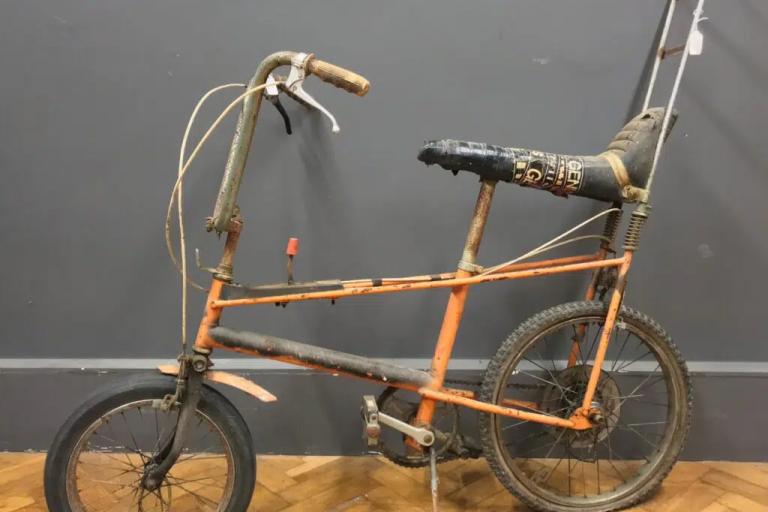
How much? Rusty old Raleigh Chopper sells for almost £700
This story is for the kind of cyclists – like me – who can’t seem to part with that knackered old rust bucket in the corner of the garage.
‘But you haven’t ridden it in ten years…’
Well, your bike hoarding may pay off some day, as earlier this week a battered, rusty Raleigh Chopper – which had spent 35 unloved years in a garden shed – fetched hundred of pounds at an auction in Derbyshire.
The seller, who owned the iconic 1970s bike as a child, was initially going to just throw it in the skip.
Instead, rather fortuitously, they took it to Hansons Auctioneers, who sold the bike for £692, almost seven times the estimate.
“It was in my dad's shed. I didn't realise it was there, just rusting slowly. It was mine in the late 1970s and early 80s when I was nine or 10,” the bike’s now former owner told Derbyshire Live.
“It's got the original gear shifter - not the later T-bar from those pesky safety people. It was great for wheelies and potholes. I remember seeing the Chopper advertised in Look-In, a kids magazine at the time.
“The advert featured a bike with a T-bar gear shifter but this one has a single-lever shifter. My dad came home with the Chopper. He bought it second hand from some chap.”
> Raleigh Chopper vs Alpe d'Huez
Auctioneer Charles Hanson said: “This was an exceptional result for an iconic bike. Due to its rusty condition, it was destined for the skip. However, it has now been saved for posterity. I hope its new owner will enjoy restoring it to its former glory.”
So there’s hope for that rusty old bike in the shed yet…
Or better yet, you could restore your old children’s bike and ride it around the route of the Tour de France (like this guy). Hmmm… I’d probably just take it to the auction.
After obtaining a PhD, lecturing, and hosting a history podcast at Queen’s University Belfast, Ryan joined road.cc in December 2021 and since then has kept the site’s readers and listeners informed and enthralled (well at least occasionally) on news, the live blog, and the road.cc Podcast. After boarding a wrong bus at the world championships and ruining a good pair of jeans at the cyclocross, he now serves as road.cc’s senior news writer. Before his foray into cycling journalism, he wallowed in the equally pitiless world of academia, where he wrote a book about Victorian politics and droned on about cycling and bikes to classes of bored students (while taking every chance he could get to talk about cycling in print or on the radio). He can be found riding his bike very slowly around the narrow, scenic country lanes of Co. Down.
Add new comment
63 comments

Karlt
|
2 years ago
3 likes
Re Why Can't We Be Like The Netherlands - What I've noticed on Soshul Medja is a bizarre argument that goes "some people (infirm, carrying heavy loads, delivering to supermarkets) can't cycle, therefore there shouldn't be cycling infrastructure", as if the proposal was to ban motor vehicles altogether. It's a sort of "cycling isn't the solution for everyone so it can't be the solution for anyone" which I just don't understand.

It's a sort of "cycling isn't the solution for everyone so it can't be the solution for anyone" which I just don't understand.
This is a well known debating tactic to make a reasonable proposal out to be something ridiculous and radical by making it a bizarre absolute, and is beloved of anyone opposing active travel provision. If you keep an eye on the reports of the attacks on active travel provision, you'll find this entirely invalid argument being made time and time again.
They don't have a valid argument to make, so try to make your arguments appear illogical and stupid.
It's a sort of "cycling isn't the solution for everyone so it can't be the solution for anyone" which I just don't understand.
This is a well known debating tactic to make a reasonable proposal out to be something ridiculous and radical by making it a bizarre absolute, and is beloved of anyone opposing active travel provision. If you keep an eye on the reports of the attacks on active travel provision, you'll find this entirely invalid argument being made time and time again.
They don't have a valid argument to make, so try to make your arguments appear illogical and stupid.
Additionally, the same criticism can easily be applied to motor vehicles - not everyone is capable of driving and there's a considerable investment needed to get a car legally on the road. I'd say that a larger percentage of the population is capable of cycling than driving (e.g. someone with epilepsy won't be allowed to drive, but could possibly ride a bike depending on the nature of their attacks).

They know they cannot win using reasonable argument.
As the school holidays demonstrate, reducing traffic by a few percent allows everything to flow better meaning a massive reduction in congestion. So getting a few out of their cars onto bicycles and walking, will help the recently worried about less than able and emergency services.
But of course the average motorist suddenly shows less concern for these recently worried about groups when storing their often pointlessly huge vehicles on the roads and pavements.

Caught me by surprise too.
And that Friday seems to be the most popular working from home day as well.
Even in the before times Friday was quieter on the trains, but only in the mornings, evenings were some of the busiest, especially at the end of the month.
And Fridays were the only evening that the train would actually depart early!

Pyro Tim
|
2 years ago
4 likes
BME
Riding from the chain ferry at Sandbanks into Purbecks when I realised I had 2 guys on my wheel, while riding into a headwind. They held my wheel for several miles until the first big hill, at this point one of them jumped off my wheel and went, his mate in doing the same said to me "you big fellas are supposed to slow down up hill". My response was "thought you were supposed to do a turn". He was sheepish, and didn't dissapear, obviously guilted into giving me a tow up the last 500m or so up the hill. Saw them repeatedly on my ride that day, despite me going a longer route



Rambling on country lanes, I have succumbed to the odd "Car down!"
In my youth I went rambling with an organised group quite often - it was common for the person at the front or rear to shout "petrol" if we were on a lane and there was a motor vehicle approaching.

Hirsute
|
2 years ago
0 likes
This bloke actually got the maximum sentence for causing death by dangerous driving.
https://www.bbc.co.uk/news/uk-wales-61020319
Judge Daniel Williams said some would find the sentence "inadequate", but he said only Parliament could change the law.

I will hapily stand corrected, but I thought the maximum sentence was 14 years for a waste of space like this.
If that is correct then the 9 years and 4 months doesn't really tie in with the line
"Judge Daniel Williams said some would find the sentence "inadequate", but he said only Parliament could change the law"
Unless there an automatic reduction for pleading guilty, and in fairness he seems to have pleaded guilty from the outset



Did no one actually decide to call the Police with someone driving eratically and on the phone? Not saying it would have saved this terrible incident from happening, but there was no discussion that had happened.
The last Dashcams vid had a similar convo happening in the car with them laughing at a persons driving, they crash over a full traffic island and continues and the people in the car querying whether to call the Police.
Although with national newspapers publishing stories of snitching and Vigilantism when reporting road crime, maybe that put them off.
This bloke actually got the maximum sentence for causing death by dangerous driving.
https://www.bbc.co.uk/news/uk-wales-61020319
Judge Daniel Williams said some would find the sentence "inadequate", but he said only Parliament could change the law.
Serious question about British law. In the US (with all its legal flaws I'm not defending) he'd have been charged with two counts of the equivalent of death by dangerous driving, plus another for the serious injuries. So he could be sentenced for each count separately and consecutively if convicted. Is that not a possibility in the UK? Is the maximum penalty the same whether you kill one child or a school bus full of them, as long as it's a single incident?


On the other hand, this happened about an hour south of me when I was seventeen years old. It made national news.
27 fatalities, driver convicted of 27 counts of manslaughter, got sixteen years.

Generally it's kill two, get one free here.
e.g. https://www.getreading.co.uk/news/local-news/purley-driver-jailed-10-yea...
Very rare for sentences to run consecutively.
Even rarer to get a life ban. The only one I've heard of (involving a cyclist) is this one
https://www.dailyecho.co.uk/news/4425581.driver-who-caused-death-of-dere...
This bloke actually got the maximum sentence for causing death by dangerous driving.
https://www.bbc.co.uk/news/uk-wales-61020319
Judge Daniel Williams said some would find the sentence "inadequate", but he said only Parliament could change the law.
He'd obviously have got a much lesser sentence if he'd killed cyclists.

Or a baby
He was also convicted of driving while uninsured
https://www.bbc.co.uk/news/uk-england-birmingham-61040451
After being convicted, it emerged Davis had made 11 previous court appearances for 35 offences including driving without insurance and drink-driving.
But cyclists should have an mot, pass a test, have insurance and a number plate.

Or a baby
He was also convicted of driving while uninsured
https://www.bbc.co.uk/news/uk-england-birmingham-61040451
After being convicted, it emerged Davis had made 11 previous court appearances for 35 offences including driving without insurance and drink-driving.
This case is the perfect example of why we need a wholesale change in driving laws, enforcement and attitudes. The current laws clearly didn't prevent this [insert epithet of your choice] from continually re-offending when he should have been banned for life for his previous convictions.
Never mind, I'm sure the government's report about a complete revision of the road laws will be published soon.
Pages
Latest Comments
- Jogle 4 hours 39 min ago
Mystery over upturned campervan in Brittany...
- Barraob1 5 hours 23 min ago
Is that justification for murder?
- ktache 5 hours 31 min ago
I have recently obtained a SPD axle removal tool from eBay, ali, anodised in blue, wanted orange. I presume it's Chinese made, too much of a...
- ChasP 5 hours 32 min ago
I find it helps particularly with a brand new tyre that retains it's folded shape to seat it with an inner tube and leave for a while. You can then...
- Rendel Harris 6 hours 11 min ago
It's not available on the NHS but it can legally be prescribed by private doctors.
- ktache 6 hours 16 min ago
Was thinking about getting a Rohloff one, but then I got a Rohloff which made it a bit pointless. And, of course I only found about it when I was...
- pockstone 7 hours 33 min ago
If one's knuckles are several inches below one's ankles...?
